Abstract
OBJECTIVE--To evaluate the additional benefit of "intensive" health care advice through six group sessions, compared with the advice usually offered to subjects with multiple risk factors for cardiovascular disease. DESIGN--Prospective, randomised controlled clinical study lasting 18 months. SETTING--681 subjects aged 30-59 years, with at least two cardiovascular risk factors in addition to moderately high lipid concentrations: total cholesterol > or = 6.5 mmol/l on three occasions, triglycerides < 4.0 mmol/l, and ratio of low density lipoprotein cholesterol to high density lipoprotein cholesterol > 4.0. Most (577) of the subjects were men. MAIN OUTCOME MEASURE--Percentage reduction in total cholesterol concentration (target 15%); quantification of the differences between the two types of health care advice (intensive v usual) for the Framingham cardiovascular risk and for individual risk factors. RESULTS--In the group receiving intensive health care advice total cholesterol concentration decreased by 0.15 mmol/l more (95% confidence interval 0.04 to 0.26) than in the group receiving usual advice. The overall Framingham risk dropped by 0.068 more (0.014 to 0.095) in the group receiving intensive advice, and most of the risk factors showed a greater change in a favourable direction in this group than in the group receiving usual advice, but the differences were seldom significant. The results from questionnaires completed at the group sessions showed that the subjects improved their lifestyle and diet. CONCLUSION--Limited additional benefit was gained from being in the group receiving the intensive health care advice. It is difficult to make an important impact on cardiovascular risk in primary care by using only the practice staff. Better methods of communicating the messages need to be devised.
Full text
PDF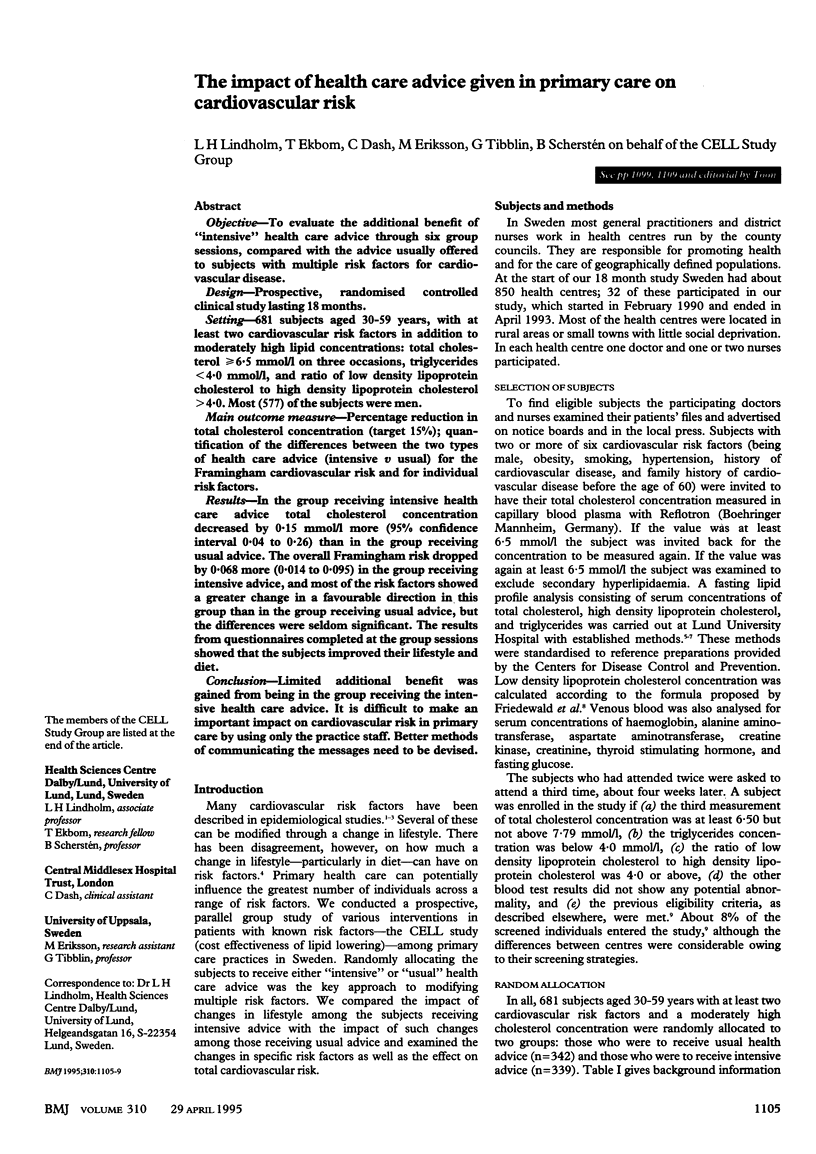
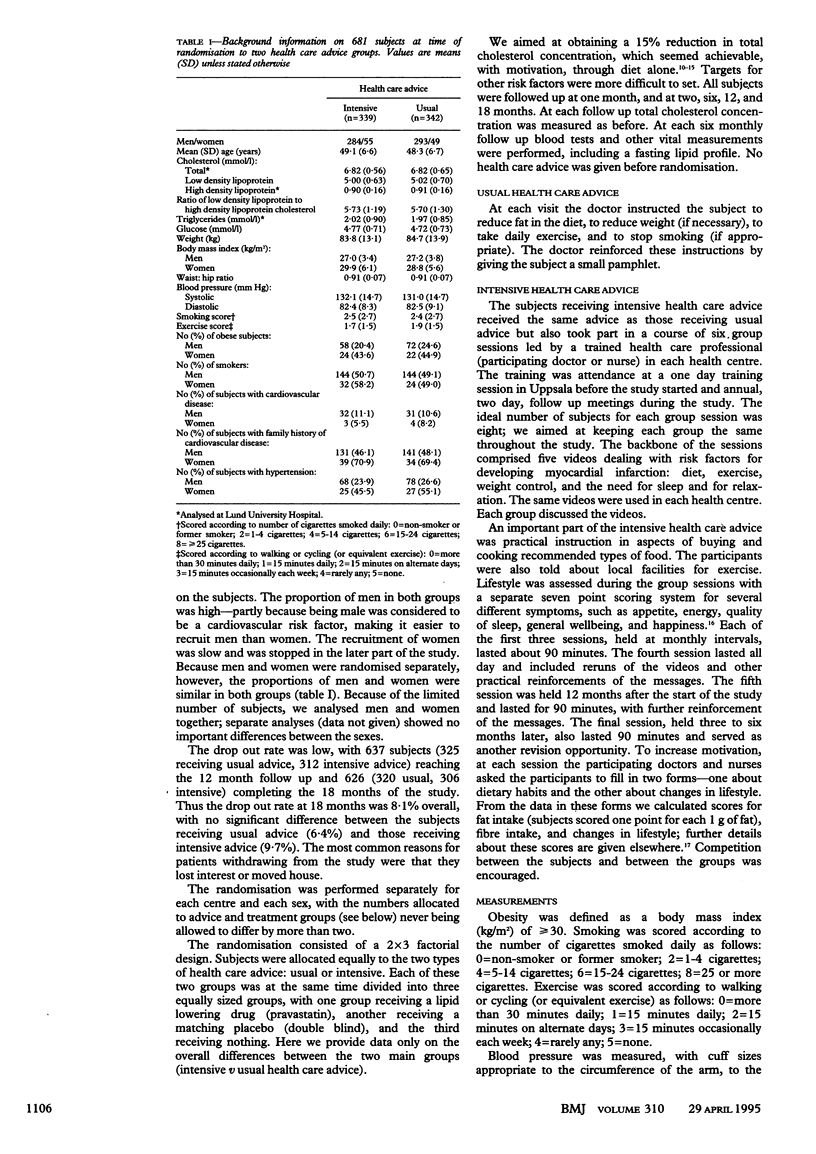
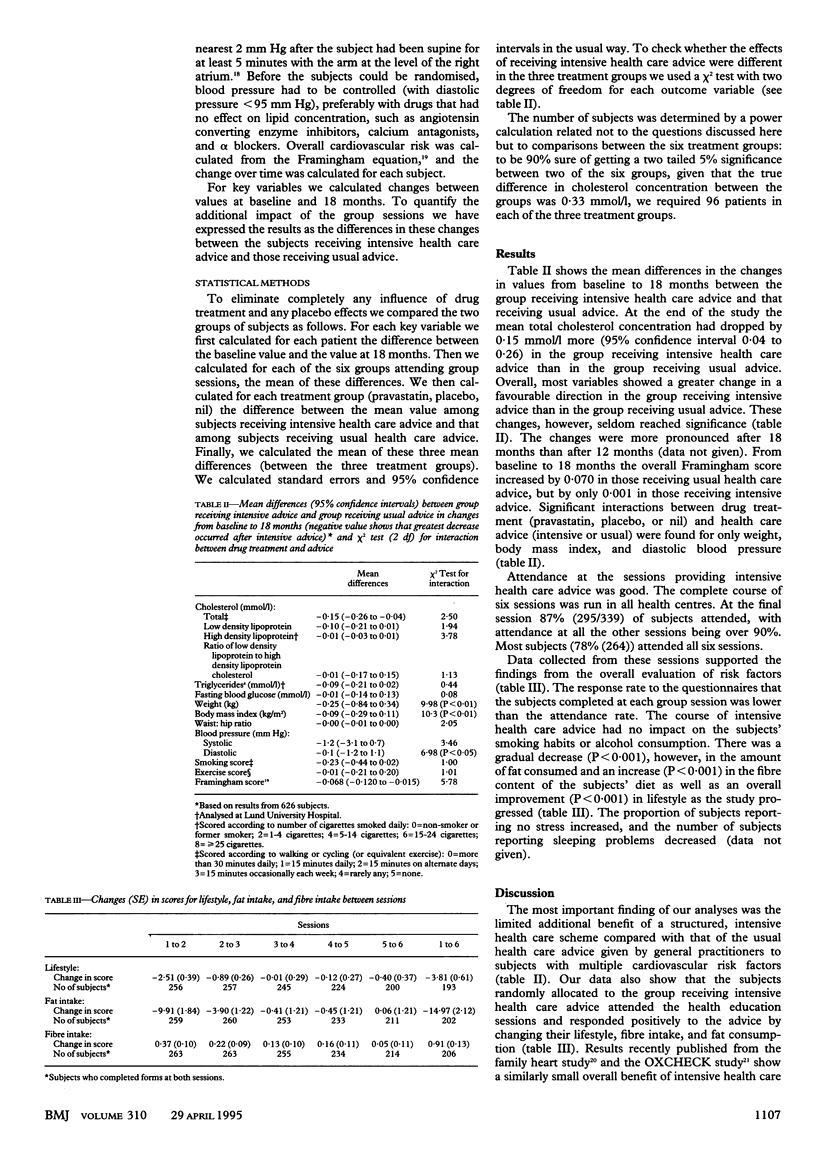
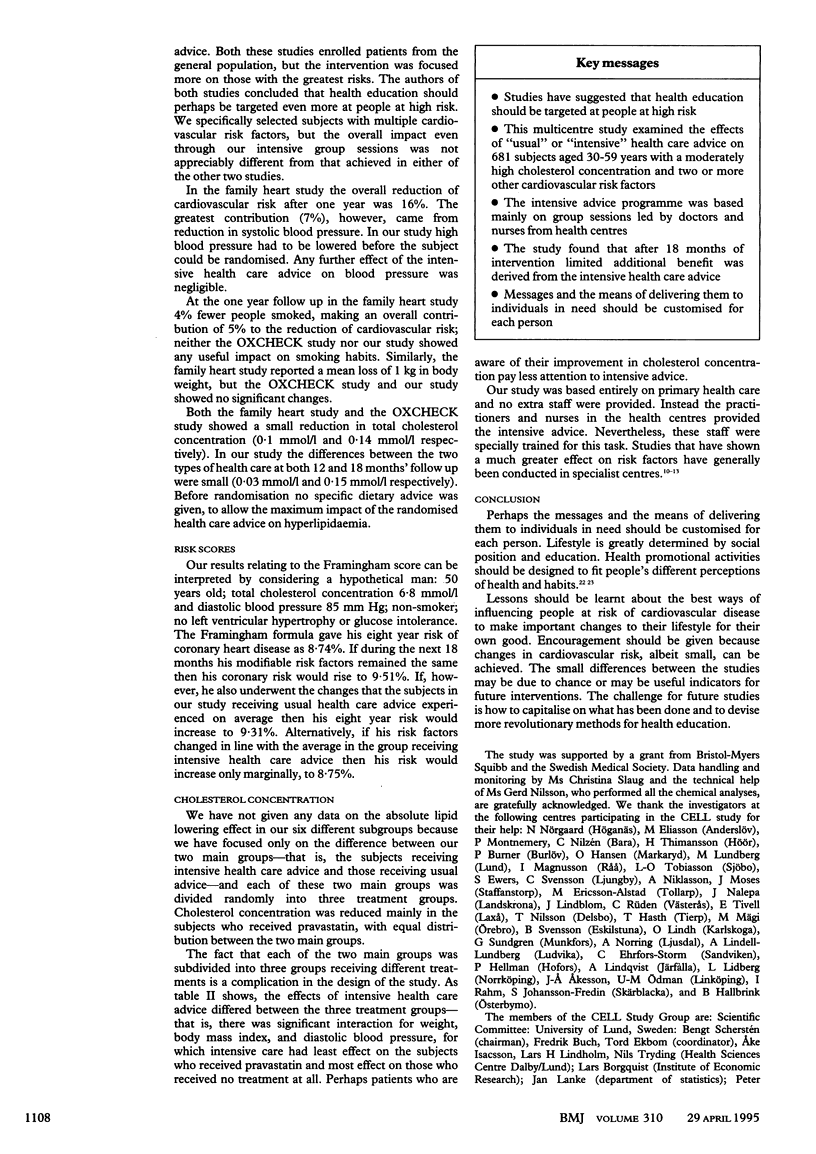
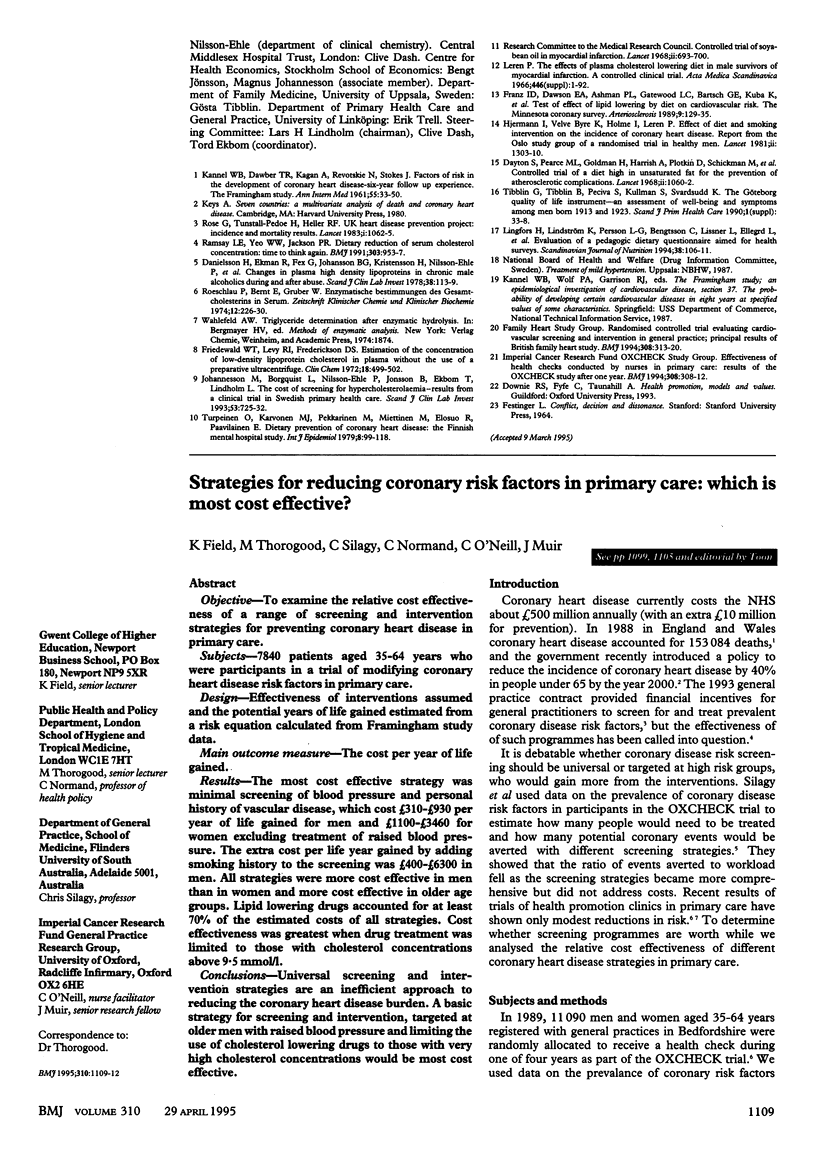
Selected References
These references are in PubMed. This may not be the complete list of references from this article.
- Danielsson B., Ekman R., Fex G., Johansson B. G., Kristensson H., Nilsson-Ehle P., Wadstein J. Changes in plasma high density lipoproteins in chronic male alcoholics during and after abuse. Scand J Clin Lab Invest. 1978 Apr;38(2):113–119. doi: 10.1080/00365517809156078. [DOI] [PubMed] [Google Scholar]
- Dayton S., Pearce M. L., Goldman H., Harnish A., Plotkin D., Shickman M., Winfield M., Zager A., Dixon W. Controlled trial of a diet high in unsaturated fat for prevention of atherosclerotic complications. Lancet. 1968 Nov 16;2(7577):1060–1062. doi: 10.1016/s0140-6736(68)91531-6. [DOI] [PubMed] [Google Scholar]
- Frantz I. D., Jr, Dawson E. A., Ashman P. L., Gatewood L. C., Bartsch G. E., Kuba K., Brewer E. R. Test of effect of lipid lowering by diet on cardiovascular risk. The Minnesota Coronary Survey. Arteriosclerosis. 1989 Jan-Feb;9(1):129–135. doi: 10.1161/01.atv.9.1.129. [DOI] [PubMed] [Google Scholar]
- Friedewald W. T., Levy R. I., Fredrickson D. S. Estimation of the concentration of low-density lipoprotein cholesterol in plasma, without use of the preparative ultracentrifuge. Clin Chem. 1972 Jun;18(6):499–502. [PubMed] [Google Scholar]
- Hjermann I., Velve Byre K., Holme I., Leren P. Effect of diet and smoking intervention on the incidence of coronary heart disease. Report from the Oslo Study Group of a randomised trial in healthy men. Lancet. 1981 Dec 12;2(8259):1303–1310. doi: 10.1016/s0140-6736(81)91338-6. [DOI] [PubMed] [Google Scholar]
- Johannesson M., Borgquist L., Nilsson-Ehle P., Jönsson B., Ekbom T., Lindholm L. The cost of screening for hypercholesterolaemia--results from a clinical trial in Swedish primary health care. Scand J Clin Lab Invest. 1993 Nov;53(7):725–732. doi: 10.3109/00365519309092577. [DOI] [PubMed] [Google Scholar]
- KANNEL W. B., DAWBER T. R., KAGAN A., REVOTSKIE N., STOKES J., 3rd Factors of risk in the development of coronary heart disease--six year follow-up experience. The Framingham Study. Ann Intern Med. 1961 Jul;55:33–50. doi: 10.7326/0003-4819-55-1-33. [DOI] [PubMed] [Google Scholar]
- Leren P. The effect of plasma cholesterol lowering diet in male survivors of myocardial infarction. A controlled clinical trial. Acta Med Scand Suppl. 1966;466:1–92. [PubMed] [Google Scholar]
- Ramsay L. E., Yeo W. W., Jackson P. R. Dietary reduction of serum cholesterol concentration: time to think again. BMJ. 1991 Oct 19;303(6808):953–957. doi: 10.1136/bmj.303.6808.953. [DOI] [PMC free article] [PubMed] [Google Scholar]
- Rose G., Tunstall-Pedoe H. D., Heller R. F. UK heart disease prevention project: incidence and mortality results. Lancet. 1983 May 14;1(8333):1062–1066. doi: 10.1016/s0140-6736(83)91907-4. [DOI] [PubMed] [Google Scholar]
- Turpeinen O., Karvonen M. J., Pekkarinen M., Miettinen M., Elosuo R., Paavilainen E. Dietary prevention of coronary heart disease: the Finnish Mental Hospital Study. Int J Epidemiol. 1979 Jun;8(2):99–118. doi: 10.1093/ije/8.2.99. [DOI] [PubMed] [Google Scholar]


